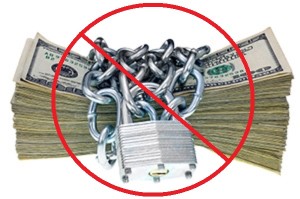No opinions or relevant summary orders from the Second Circuit today.
Operating with only 8 justices, a fractured Supreme Court today decided Luis v. United States. The Court’s holding is that “pretrial restraint of legitimate, untainted assets needed to retain counsel of choice violates the Sixth Amendment.”
Justice Breyer’s plurality opinion, joined by Chief Justice Roberts and Justices Ginsburg and Sotomayor, explains that 18 U.S.C. § 1345 generally authorizes the government to freeze the assets of people accused of federal banking or health-care crimes. Specifically, § 1345(a)(2)(B)(i) authorizes the pretrial restraint of “property of equivalent value,” meaning property that is neither “obtained as a result of” nor “traceable to” the alleged crime.
This license to freeze “property that is untainted by the crime, and that belongs fully to the defendant,” violates the Sixth Amendment if such funds (in Luis’s case, some $2 million) are needed to hire counsel of choice. The plurality reached this conclusion by balancing the fundamental Sixth Amendment right to counsel against the government’s “important,” but inferior, interest in wishing to “guarantee that [untainted] funds will be available later to help pay for statutory penalties (including forfeiture of untainted assets) and restitution, should it secure convictions.”
The plurality distinguished opinions upholding post-conviction forfeiture and pretrial restraint (respectively, Caplin & Drysdale, Chartered v. United States, 491 U. S. 617 (1989), and United States v. Monsanto, 491 U. S. 600 (1989)), on the ground that those cases involved the seizure of tainted assets rather than “the defendant’s own ‘innocent’ property– property with no connection to the charged crime.”
In practice, the plurality explained, its ruling will save certain moneyed defendants (those without obviously tainted assets) from being “rendered indigent” and forced to “fall back upon publicly paid counsel, including overworked and underpaid public defenders,” which would “render less effective the basic right the Sixth Amendment seeks to protect.” (The plurality, I would be remiss not to mention, apparently didn’t get the Ninth Circuit’s memo: “[F]ederal public defenders, [] in our experience, typically provide the highest quality representation, very often superior to that provided by members of the private criminal defense bar. Nor are we alone in that opinion: A survey of 457 federal district and appellate judges, published as part of an article co-authored by Judge Posner of the Seventh Circuit, rated advocacy by public defenders in federal court significantly higher than that provided by privately retained attorneys, court-appointed attorneys, and even prosecutors.” United States v. Brown, 785 F.3d 1337, 1348 n.5 (9th Cir. 2015) (citation omitted). Justice Kennedy noted in his dissent, summarized below, that “it would be troubling to suggest that a defendant who might be represented by a public defender will receive inadequate representation.”)
Justice Thomas concurred with the plurality but relied “strictly on the Sixth Amendment’s text and common-law backdrop” to conclude: “Because the pretrial asset freeze here crosses into untainted assets, for which there is no historical tradition, it is unconstitutional. Any such incursion violates the Sixth Amendment. . . . I cannot go further and endorse the plurality’s atextual balancing analysis.”
Justice Kennedy, joined by Justice Alito, dissented. In their view, the majority’s holding is contrary to Caplin & Drysdale and Monsanto, not required by the Sixth Amendment, and depends on a distinction between tainted and untainted property that, given money’s fungible nature, is at best difficult to discern and at worst illusory. The majority’s rule also “rewards criminals who hurry to spend, conceal, or launder stolen property by assuring them that they may use their own funds to pay for an attorney after they have dissipated the proceeds of their crime. . . . The true winners today are sophisticated criminals who know how to make criminal proceeds look untainted.” (This view, I would also be remiss not to mention, seems to presume the impossibility of defendants who, as the plurality put it, “lack ‘tainted assets’ because they are innocent.”)
Justice Kagan also dissented. In her view, Monsanto is a “troubling decision” because it allows the government to “freeze assets that a defendant needs to hire an attorney, based on nothing more than ‘probable cause to believe that the property will ultimately be proved forfeitable.'” Nonetheless, “the correctness of Monsanto is not at issue today.” For the reasons given in Justice Kennedy’s dissent, and “[b]ecause the Government has established probable cause to believe that it will eventually recover Luis’s assets, she has no right to use them to pay an attorney.”

